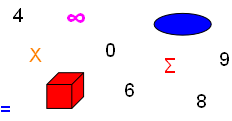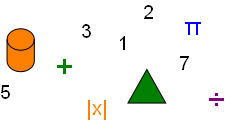



Prime and Composite Numbers


Prime numbers are any positive whole integer greater than 1 that cannot be divided by another positive whole integer or lesser value to have a positive whole number integer result. A whole number integer is considered prime if that number can only be divided by 1 or itself.
1. Zero is not a prime number. Division by 0 is invalid math.
2. The only even prime number is 2. All other even numbers can be divided by 2.
3. If the sum of a number's digits is a multiple of 3, that number is not prime. It can be divided by 3.
(81 is 8+1=9, 9 divides by 3) (1671 is 1+6+7+1=15, 15 is divisible by 3)
4. No prime number greater than 5 ends in a 5. Any number greater than 5 that ends in a 5 can be divided by 5.
The mathematical value of prime numbers is to have multipliers that are their lowest positive whole number value. If we where to divide 24 its prime numbers would be 2 and 3. That is, 2 x 2 x 2 x 3 = (23)(3) = 24. Both 2 and 3 are prime numbers.
Prime numbers are useful in mathematics for sciences where formulas and equations describing physical phenomenon are empirical, reduced to their simplest and lowest terms. They are also used for RSA Cryptography and Hybrid RSA Cryptography for security encoding and data encryption algorithms.
Positive whole number integers not prime and greater than 1 are composite numbers.
Prime Numbers Between 1 and 1000

The number one is not prime or composite.
Copyright © DigitMath.com
All Rights Reserved.